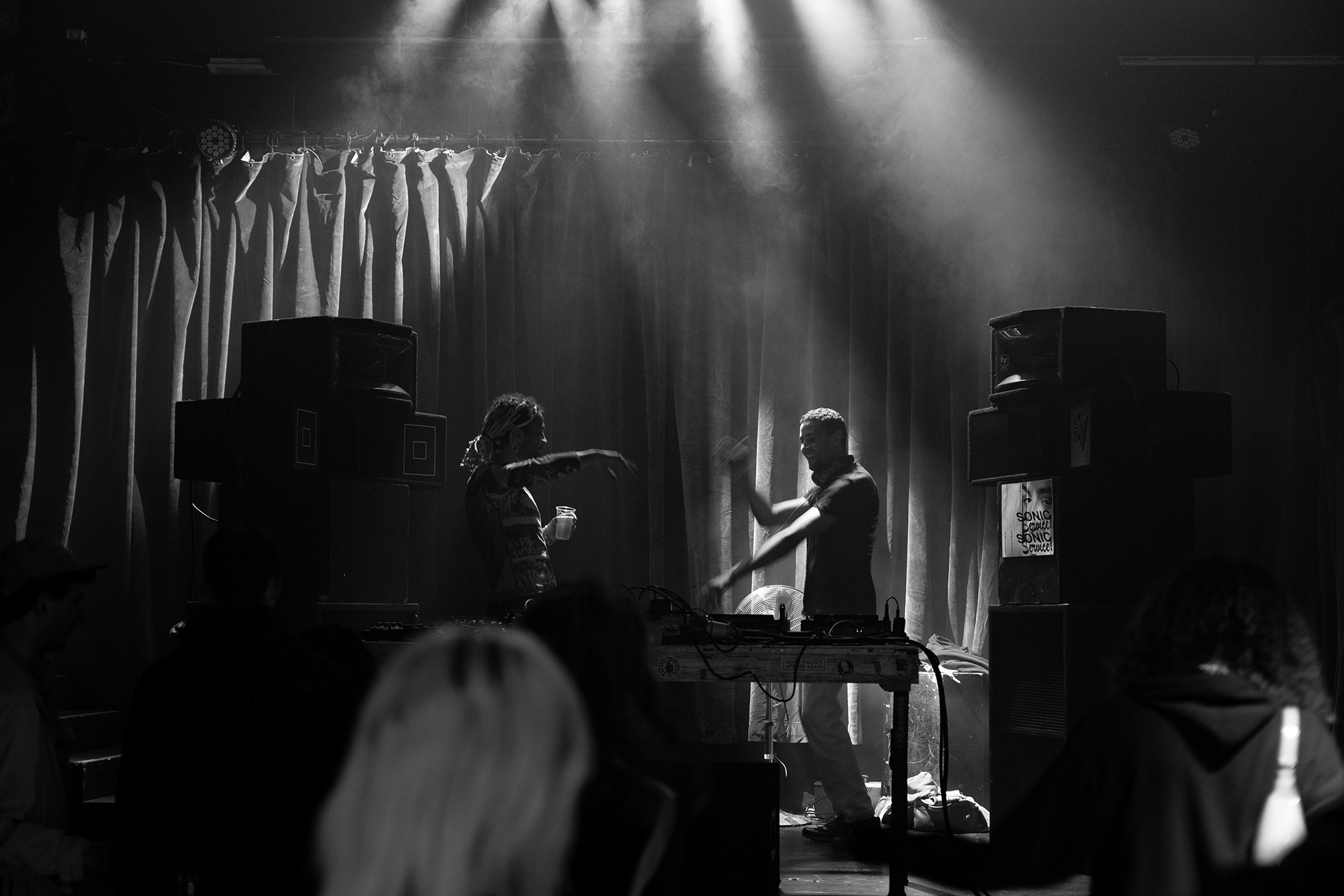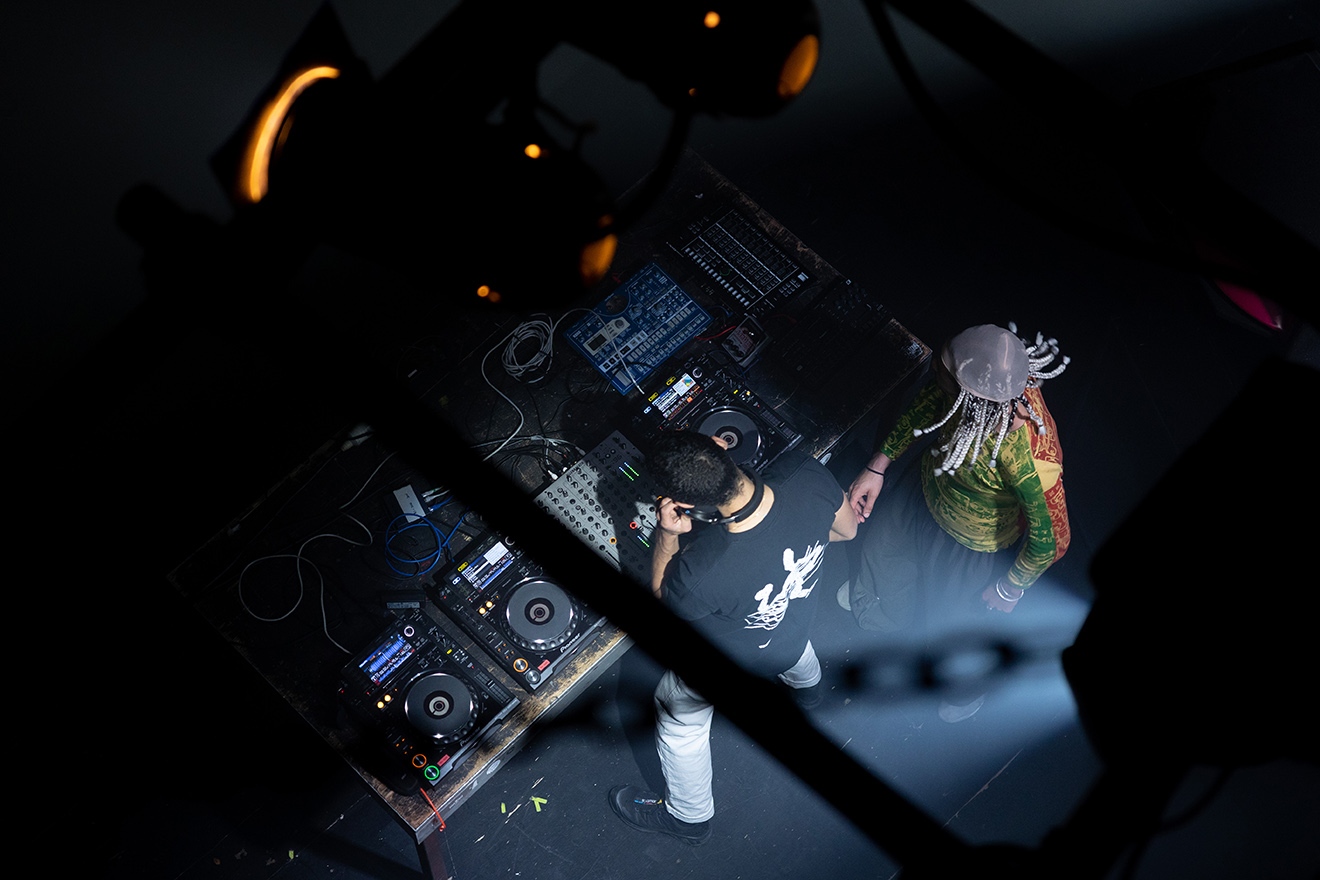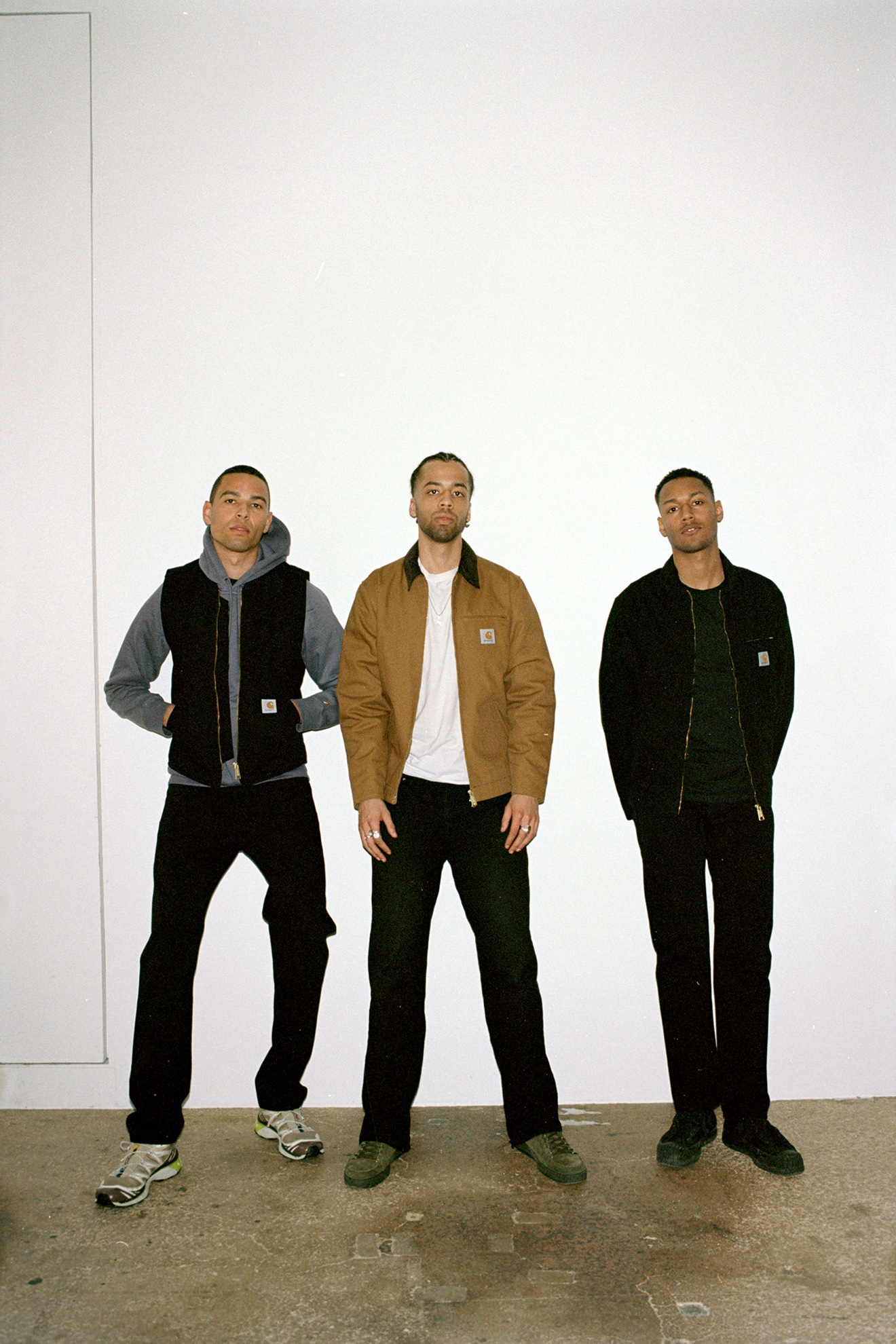 Features
Features
A brotherhood of bass: Somatic Rituals are spearheading new sounds in Switzerland
Producers Kombé, Mafou, and Mukuna are the collective at the helm of Basel’s forward-thinking club scene. Now, they are connecting the dots within their community
It's the last Saturday night of June on Frankfurt-Strasse, an inconspicuous street in Basel's industrial outskirts. Just before 1:AM, a crowd of several hundred revellers line the street, gravitating towards the entrance of Elysia, a small club with an international reputation as one of Europe's best-sounding venues, thanks to its bespoke Lambda Labs soundsystem. Having recently celebrated their sixth anniversary, the night marks Elysia's final hurrah before the club shuts for the summer season.
Inside, the dancefloor is brimming with energy as the growing crowd twists and contorts their limbs in broad, free-flowing movements. The space between dancers doesn't feel awkward; it's an invitation to let the crystalline sound flow through the room. The stage feels set for Somatic Rituals, one of the most exciting new labels operating out of Switzerland today.
For the next two hours, founders Kombé, Mafou and Mukuna journey through shades of ambient techno, deep tribal grooves such as Linkwood's 'Nae Drama', Pariah's 'Caterpillar', gqom from the likes of Scratcha DVA into Overmono's 'Gunk' and Mafou’s 'Khezu', the lead track off his debut EP. It’s a rolling, percussive number that breaks down at the halfway mark only to come roaring back with even thicker drums and hypnotic bass droplets. By the time Mafou drops it, the crowd is in a frenzy.
"I've never seen the club like this before," Jannik Roth observes, a veteran of the Basel scene and an industry mentor to emerging artists. He's the curator behind 'Make Some Room: Electronic Relief in Switzerland', a comprehensive compilation series featuring more than 150 artists from across the country, which Kombé, Mafou and Mukuna, who are all producers in their own right, feature on. Roth explains that while Elysia has a reputation as an "audio temple", it's rare for a crowd to be this energised by UK and bass-heavy sounds, which until recently were still considered experimental among the small but tight-knit Swiss scene. Tracing the sounds of their shared Afro-diasporic roots with mind-altering rhythms and percussive grooves, founders Kombé, Mafou and Mukuna have created a space for their collective vision to take flight. The night's success signals a shift, one that Somatic Rituals have had a strong hand in shaping.


"Nowadays, the crowds are much more open, and you can play a wider array of sounds. That wasn't always the case," Kombé says earlier that day as we sit down discussing the label's journey at Flore, a café owned by members of the DJ collective Alma Negra. The oldest of the trio, Kombé appears as the de facto spokesperson of the group, prepared to quip on any subject thrown his way. Beside him sits Mukuna, a trained graphic designer and the fashionable youngest, sporting a pair of retro Thai shorts in the scorching afternoon heat. Across him, Mafou, who cuts a zealous figure as he recounts his musical origins. Raised by a Senegalese percussionist, Mafou’s childhood was marked by a fascination with drums. Back then, he knew Mukuna as a djembe pupil of his father’s, but the two later reconnected in high school, where they bonded with Kombé over their mutual fascination with bass-heavy dance music. As the trio began partying as teenagers, they looked up to Bambounou and the crew around Parisian label CleckClekBoom, eventually, trying their hands at DJing in Basel's off-location parties and the scene favourite Hinterhof Bar, which provided fertile ground for creative experimentation.
"When the Elysia club opened in 2016 and was shopping around for their first resident DJs, we were next in line," Kombé notes with a smirk. "It was fascinating to witness how the club started. On the one hand, they launched this very ambitious concept with that grandiose [Lambda Labs] soundsystem, but on the other hand, they had very few visitors, at least at the beginning." He remembers one of those nights, playing with nthng, to a group of about 20 people, which didn't stop anyone from having a great time. “In the end, everyone was dancing behind us in the booth," he laughs. Soon afterwards, things started falling into place. With continued trust from Elysia, they could build up a crowd that appreciated their artistic direction.
Since 2017, the crew brought artists like Bambounou, Roi Perez, Tom Trago and a handful of UK idols like Joy Orbison, Batu, re:ni and Ploy to Basel. Although these names would hardly be considered wildcards on the international circuit, Mafou feels their curation offers a musical education to the local crowd. “It was amazing to see some people come over from other parts of the country: that gives us the confidence to continue pursuing what we do."
The label launch followed shortly after with the release of a casette tape titled 'SORI 001', which marked the Komé, Mafou and Mukuna’s production debut. Kombé describes these six collaborative tracks as a 'full body work' that came about after a trip to a valley between the Swiss mountains, where the plants were so dense and abundant they resembled a jungle. There's a reflective sensibility that runs like a thread through the tape: gentle drums float atop ambient melodies on ambient opener 'Vast', hints of Larry Heard's stargazing house appear on 'Kap Skiring', 'Confound' leans deeper into percussive techno, closer 'Morel' pairs multi-layered drum patterns with the swing of a contrabass bassline. It's an astonishingly sophisticated debut and an example of how founding the collective offered Kombé, Mafou and Mukuna a retreat and a place where they were always understood.

One of the biggest challenges of the scene in Switzerland is the lack of a music industry infrastructure compared to neighbouring countries like Germany and France. "There really are so many good artists and DJs in Switzerland, but they're extremely underrated, under the radar, and dependent on outside support," says Kombé. "In other big cities like Berlin or Paris there are these institutions, publications, agencies and bigger, better organizers around to get you where you want to be you get there much faster." Last month Mafou's latest track, a mutant techno stepper titled "Nomad", was released via the French label Grid. He cites connecting with Jannik Roth, who runs Planisphere, one of the country's only music management agencies, as a valuable step in taking his career to the next step. His EP 'Khezu' was co-financed by a cultural fund for young creatives. "We're lucky to have strong cultural funding bodies in Switzerland, but we didn't even know this was available to us, and it was Jannik who really pushed us to engage with this part of the industry."
Support is also steadily coming in from abroad. Rhythm Section International featured Mafou on their latest 'SHOUTS' compilation, and Somatic Rituals were one of the first residents of the expertly curated Frankfurt-based community radio EOS Radio. A work-related move to Amsterdam in 2020 lead Mukuna to broaden the label's connections in the Netherlands. When United Identities founder Carista was booked to play at Elysia, she requested to be joined by Somatic Rituals. Although Mukuna landed in these new surroundings at the height of the pandemic, he was heartened by the fact that the community in Amsterdam embraced him so quickly, and he still goes back frequently to play at Garage Noord, one of the city's most forward-thinking venues. Back home, Kombé and Mafou forged connections with another community-driven music collective called Okra, founded on the heels of the global Black Lives Matter Movement to bring BPoC artists to the forefront and give them a platform in Basel's nightlife. Shortly afterwards, all three joined the collective (Mukuna, a graphic designer by day, provided their visual identity) and co-curated their own small festival consisting of all-BPoC artists. Since its founding, the collective has hosted club nights, concerts, short film screenings, as well as small community dinners and gatherings reserved for people of colour. This summer, the Okra collective hosted a stage at Gurtenfest, one of Switzerland's biggest festivals with 75,000 attendees. As ever, Kombé, Mafou presented a united front behind the decks.
Mafou describes this shared feeling of community and solidarity that came from this union with Okra as a beautiful experience. "For me, it was also very emotionally important because the Black community is just not very [well] represented in Switzerland or in Basel. It's important for us to do the work and to offer a platform for young artists like us and to be able to tell people who look like us, 'Hey, you can be a vital part of the scene, too.' This kind of engagement became another pillar of our mission."
Caroline Whiteley is a freelance journalist, follow her on Instagram


